Denver Mayoral Survey
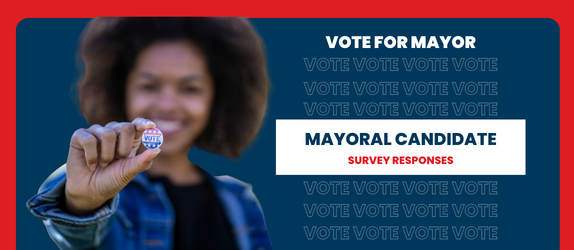
Candidates for Denver Mayor weigh in on issues facing our community
The Colorado Women’s Chamber of Commerce asked the mayoral candidates to submit answers to questions on how their leadership would impact women in business.
- In a single sentence, why are you running for Mayor?
- What do you think are two of the biggest challenges impacting women in the workforce? How would you address these?
- What can be done to attract women and BIPOC women-led businesses to Denver? How can Denver continue to support existing women and BIPOC-led businesses?
- The pandemic significantly shifted the business landscape in Downtown Denver. What do you think can be done to attract and keep businesses in Denver?
- The cost of living in Denver has increased dramatically in recent years, which impacts single-parent/caregiver and single-income homes at greater rates. If elected, how would you address the issue of housing affordability and the cost of living?
- As you build your leadership team, what would your plan be to build a well-rounded cabinet of advisors to support an inclusive city?
Of the 17 candidates who qualify to have their names on the ballot, 13 responded to our survey. In addition, two write-in candidates also participated. Here are their responses listed in the order that the candidates will appear on the ballot.
Ballots will be sent by mail on March 13, 2023 and voters have until April 4, 2023 to vote.
Lisa Calderón lisafordenver.com
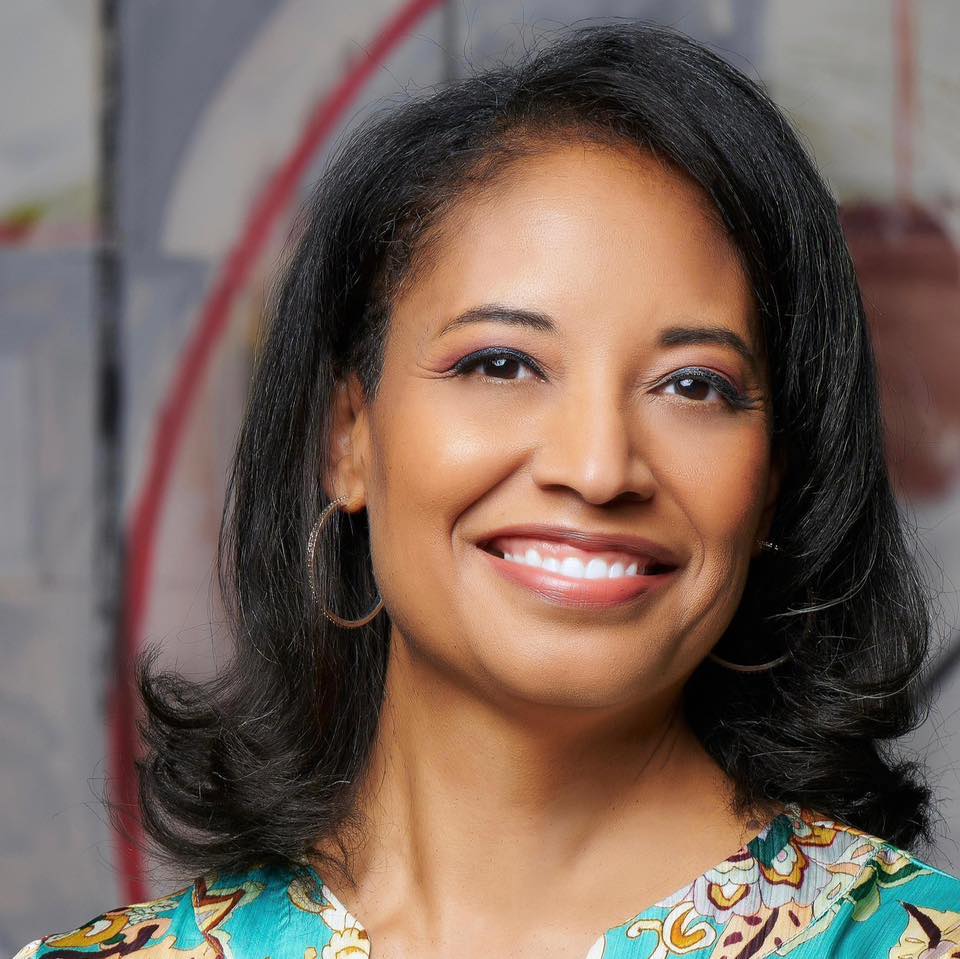
In a single sentence, why are you running for Mayor?
I’m running to decentralize city government, put services into our neighborhoods, and co-govern with community stakeholders – As mayor, I will create publicly-funded affordable housing, serve our unhoused neighbors with real solutions, reject the false binary between over-policing and community safety, and build a Denver in which everyone can afford to live, work, and enjoy.
What do you think are two of the biggest challenges impacting women in the workforce? How would you address these?
Women in the workforce – particularly women of color – are disproportionately impacted by inequalities grown out of the two biggest issues facing all of Denver – housing affordability and homelessness, and the cost of living. Nationally women still earn a fraction of men in the workforce, with the inequity being exponentially worse for women of color. To support women in the workforce, we must advance solutions to the underlying issues, and support labor practices that protect workers, and ensure everyone has access to good-paying jobs.
As such, we must advance affordable housing and reduce the cost of living in Denver, while supporting labor. To do this, we need expansive social housing, run by the city in underutilized and repurposed spaces. By expanding social housing, and keeping it off market, we can ensure the cost of housing remains low and accessible to the community members with the greatest need.
On labor, we need to:
– Fully support the right to unionize, and the right to strike, including for city workers
Bring labor and small business to the decision-making table as collaborators not enemies
– Use Project Labor Agreements for publicly funded construction projects to ensure funds are being used responsibly with equitable hiring and the well-being of workers in mind
– Listen to current and former city employees as they ask for support and help in their work
What can be done to attract women and BIPOC women-led businesses to Denver? How can Denver continue to support existing women and BIPOC-led businesses?
Women and BIPOC owned businesses are closing at a fast rate due to economic pressures and a lack of sufficient government support. Denver can ensure these business thrive by directly supporting them, including:
– Giving procurement preferences to BIPOC and women-owend businesses
– Support growing the Denver Economic Development and Opportunity Department to help create worker-owned businesses
– Create reliable funding streams for Legacy Businesses with historical and cultural ties to the community
– Diversify Business Improvement Districts to ensure representation of women- and black- and brown-owned businesses.
– Encourage more mixed-use development that gives priority to small, Denver-based businesses
The pandemic significantly shifted the business landscape in Downtown Denver. What do you think can be done to attract and keep businesses in Denver?
Downtown has earned a horrible reputation due to 12+ years of failed policies. We have the opportunity to continue to improve downtown by making it a cultural hub that works for everybody – not just wealthier Denverites and tourists. But current use and development of 16th Street Mall is hindered by failures to address other core issues, such as affordable housing, support for the unhoused, and multi-modal transportation. While Downtown has been the focus of the city’s development, planning, and economic resources, it has come at the detriment of economically disadvantaged Denver residents. With policies that recognize the interconnected nature of solutions to these issues, we can support a 16th Street Mall that works for everyone.
As Mayor, I will implement a robust plan to address issues of homelessness, affordability, housing, transportation, and community safety which are all essential to making sure downtown works for everyone.
This includes:
– Implementing housing-first and harm-reduction policies for unhoused neighbors
– Implementing a safer and more connected multimodal transportation system to meet Denver’s needs and de-center cars from downtown transport
– Bringing together our small businesses and art leaders to determine how to grow our downtown
– Creating reliable funding streams for at-risk Legacy Businesses with historical and cultural ties to the community
– Promoting business growth along with our arts to achieve both modernization and cultural celebration
– Repurpose brown and grey space to introduce dense, affordable, and social housing in Denver
– Use city funds to acquire affordable housing, hotels, and commercial offices for housing-first policies
The cost of living in Denver has increased dramatically in recent years, which impacts single-parent/caregiver and single-income homes at greater rates. If elected, how would you address the issue of housing affordability and the cost of living?
Our housing crisis is our number one issue in Denver and will need immediate and multifaceted solutions. We must repurpose land use and preserve our green space, which we cannot afford to lose. Building attainable and affordable housing to meet the needs of individuals and families today, and over the next few years, will require a fundamental restructuring of the city’s housing portfolio. Only about 1% of Denver’s housing units are dedicated to public housing. All of this must be done while focusing on sustainability, ensuring safe multimodal transportation, and combating gentrification.
To achieve this:
– Repurpose brown and grey space to introduce dense, affordable, and social housing
– Strengthen tenants’ rights through just eviction law and providing an option for tenants to buy their buildings
– Support preferential zoning to community land trusts which prioritize the needs of residents while generating wealth
– Include community members in new development planning by implementing participant-public-private partnerships
– Create inclusionary zoning that requires new development to offer housing to low- and moderate-income families at or below 50% average monthly income
– Eliminate the red tape around permits that slows homeowners and builders from completing projects
As you build your leadership team, what would your plan be to build a well-rounded cabinet of advisors to support an inclusive city?
Denver became a city in which special interests took priority over workers, residents, and small business owners. This widened racial and wealth inequality and hastened the displacement of marginalized communities. I’m running for mayor to build a transparent city government that shares power by decentralizing city hall and moving representation into neighborhoods.
This looks like including community input at all levels of decision-making, including for mayoral-appointed positions – specifically more women in leadership at the Cabinet level and as heads of departments that have historically been held by men such as in our public safety departments. Moreover, I will ensure cabinet positions are filled by individuals from marginalized groups in order to build a cabinet that represents the people of Denver, and those the city should most serve.
Trinidad Rodriguez trinidad4denver.com
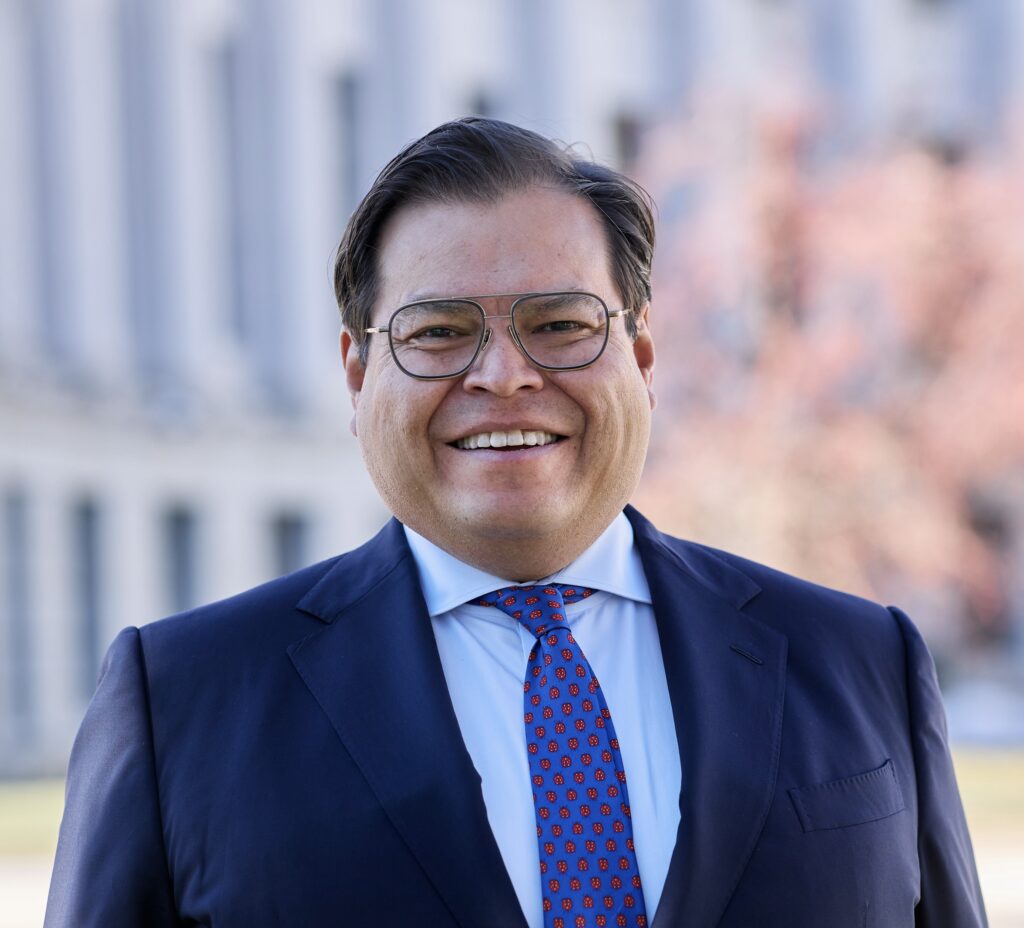
In a single sentence, why are you running for Mayor?
To make Denver a city where every Denverite, regardless of the neighborhood they’re in whether it’s the West Side with a single mom like me or a place with more advantage, can achieve their version of success.
What do you think are two of the biggest challenges impacting women in the workforce? How would you address these?
In recent years Coloradans have achieved many gains toward structural balance in the workplace for women through groundbreaking policies such as paid family leave and equal pay for equal work.
I applaud the work of the team at the Downtown Denver Partnership who have driven for new and intentional research on the challenges and opportunities women face in all aspects of our local and center city economies. As chair of the board, my leadership of the creation of our first inclusion platform promoted women-led efforts such as these.
Women’s participation in Colorado’s and Denver’s labor forces has declined, consistent with the experience in the US, which is alone in seeing such decline among Organization for Economic Cooperation and Development countries. My administration’s Economic Development team will conduct an audit to determine driving factors, and what Denver can do to change this trend. Women are critically important to our workforce and value proposition as a place-based economic development approach.
Inclusive city design is woefully inadequate in addressing women’s perspectives and needs, in particular. I will ensure that Denver eliminates this blindness in our design and standard setting processes for the public realm and infrastructure in and around our work centers. Women should experience their city in total comfort and safety.
What can be done to attract women and BIPOC women-led businesses to Denver? How can Denver continue to support existing women and BIPOC-led businesses?
Among Denver’s greatest strengths is as a place of rich entrepreneurship. According to research reported by Dr. Virginia Santy, female entrepreneurs tend to start and continue as micro businesses. In accordance with her recommendation Denver should work to develop industry and capital infrastructure to help such enterprises to graduate to small and medium sized businesses. This will be critical in attracting business seeking to increase their impact. The Commons on Champa has successfully harnessed women’s leadership. I want to expand this concept to the Commons on Champa District, creating a district ecosystem that can further support the launch, expansion and attraction of women and BIPOC women led businesses in a place-based, city building strategy.
The pandemic significantly shifted the business landscape in Downtown Denver. What do you think can be done to attract and keep businesses in Denver?
My plans for safety and affordability are designed specifically to support small business entrepreneurs in our city whose customers and employees want a sense of safety. My administration will cut red tape by smoothing out compliance processes, adding the question to each Denver’s inspectors and front line workers, “how can I support our small business customers” in each transaction and interaction.
I support the development of new small business support efforts, particularly focused on women and BIPOC owned businesses and making our existing programs more accessible.
I will set a goal of achieving real growth of the city’s gross domestic product that is no less than 150 basis points higher than that of the US economy.
The mayor is the chief of economic development and sales of the city. Growth in the economy is a key responsibility of the mayor, which is best and most efficiently achieved by supporting existing and recruitment of new businesses. The mayor must be active in setting the tone for an all-in efforts with organizations like the Partnership, Denver Metro Chamber, trade groups, the state and regional partners.
The cost of living in Denver has increased dramatically in recent years, which impacts single-parent/caregiver and single-income homes at greater rates. If elected, how would you address the issue of housing affordability and the cost of living?
I will accelerate the creation of total housing supply and its diversity, particularly housing stock. Serving on the board of DHA for 11 years, I helped lead its first affordable housing bond backed by Denver to speed up the delivery of 5,000 units.
I will catalyze private sector momentum in the supply of “missing middle” housing types priced to be affordable to moderate income households. These can be built in medium and medium-low density along high frequency transit corridors and nodes.
Denver also needs to cut red tape and accelerate the permitting process, which involves investing in logistics plans and accountability.
As you build your leadership team, what would your plan be to build a well-rounded cabinet of advisors to support an inclusive city?
Throughout my career I’ve built and invested in diverse teams for the sake of delivering better outcomes. It’s extremely important to me because the cabinet, appointees, employees, and board and commission members are the ones who lead the development of our culture and values. I commit to appoint a woman to chair my transition committee, which will develop leadership profiles and short listing candidates for cabinet positions. The composition of all committees and subcommittees will be diverse and inclusive reflecting the population of our city with particular emphasis on increasing participation by people coming from underrepresented communities. In building the cabinet itself, this structure will be continued.
As someone who was a severely underrepresented group in the finance profession, I offer to value and protect differences of our diverse team to ensure we can achieve authenticity in all that we do to lead this city as a team.
Aurelio Martinez amfdm.com
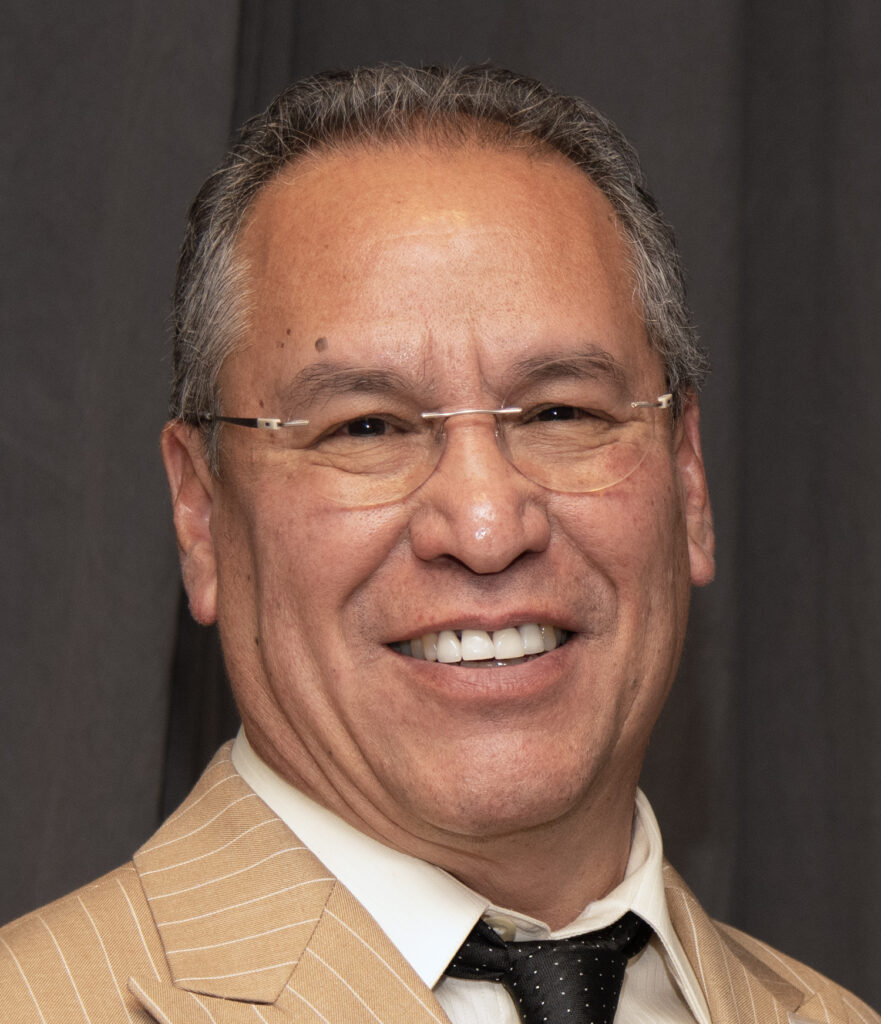
In a single sentence, why are you running for Mayor?
To give more control to neighborhoods, residents, workers and small businesses.
What do you think are two of the biggest challenges impacting women in the workforce? How would you address these?
Executive equality, pay equality. Our administration will mandate equality throughout our administration and will require the same equalities for women with contractors doing business with the city of Denver.
What can be done to attract women and BIPOC women-led businesses to Denver? How can Denver continue to support existing women and BIPOC-led businesses?
Denver’s department of Economic Development has to do more than just be “to do list” distributor for women and BIPOC start-up businesses. With over 11,000 employees, Denver can offer incentives such as discounted rates to employees for doing business with women and BIPOC small business.
The pandemic significantly shifted the business landscape in Downtown Denver. What do you think can be done to attract and keep businesses in Denver?
First and foremost, the deterioration of the Central Business District (CBD) was not solely the fault of the pandemic. Like so many other problem issues facing Denver, a poorly run administration had much to do with downfall of the CBD. As Mayor, we will bring attractions to the 16th. Street Mall, such as a Zip Line, sky drop and permitted street performers. This will bring people back and with frequent visitors, businesses with start to come back to the 16th. Street Mall.
The cost of living in Denver has increased dramatically in recent years, which impacts single-parent/caregiver and single-income homes at greater rates. If elected, how would you address the issue of housing affordability and the cost of living?
The minimum wage has to stay aligned with the cost of living for large corporations and companies. Small businesses should have an exemption as to not put a hardship and have them close down. Rent caps or some form of rent caps are a must in order to have people working in Denver live in Denver.
As you build your leadership team, what would your plan be to build a well-rounded cabinet of advisors to support an inclusive city?
This is the most important question in this questionnaire! Denver’s poorly run administration is the reason Denver has so many problem issues. Cabinet members, department heads and advisors have to be carefully interviewed and screened so that our administration is run by experienced and knowledgeable people. Each applicant will be vetted by our interviewing groups.
Thomas Wolf wolfdenvermayor.com

In a single sentence, why are you running for Mayor?
To provide strong competent leadership and make Denver safe clean and smart.
What do you think are two of the biggest challenges impacting women in the workforce? How would you address these?
For urban Denver women I think safety, when listening to my wife and daughters I would say work life balance.
What can be done to attract women and BIPOC women led businesses to Denver? How can Denver continue to support existing women and BIPOC led businesses?
Celebrate and trumpet their achievements in national forums, and embedding within that narrative what is unique about Denver in this regard. Make sure they are at the table for Denver procurement decisions, and make sure they are networked with each other.
The pandemic significantly shifted the business landscape in Downtown Denver. What do you think can be done to attract and keep businesses in Denver?
End encampments via city provided shelter, to restore safe clean streets. We are really a tale of two downtowns – lower with a healthy mix of office, residential, retail and entertainment, and upper which is predominantly commuter office space. Lower’s composition is more current and diverse and upper’s is older and stagnant, which will need to evolve to survive.
The cost of living in Denver has increased dramatically in recent years, which impacts single-parent/caregiver and single-income homes at greater rates. If elected, how would you address the issue of housing affordability and the cost of living?
Please see my website for my policy.
As you build your leadership team, what would your plan be to build a well-rounded cabinet of advisors to support an inclusive city?
Having a science and global capital markets background, I have seen the proof that diverse opinions, experiences, and skills yields superior durable performance. I have also been on many high functioning teams in academics, work and sport, and know how to attract and build winners.
Al Gardner – No Response
Terrance Roberts terrancerobertsformayor.com
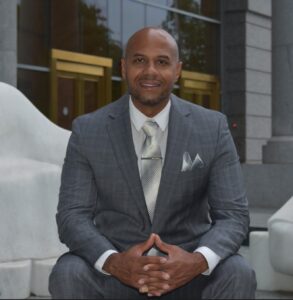
In a single sentence, why are you running for Mayor?
Denver needs real leadership to move the needle on our housing crisis to address the poverty and violence connected to it in our communities.
What do you think are two of the biggest challenges impacting women in the workforce? How would you address these?
Women have historically been discriminated against concerning equal pay, and promotions. My campaign and community organizing ensures that women, especially women of color are paid the same, promoted, utilized properly to their best ability and skill set, and respected as leaders, because they are the leaders actually.
What can be done to attract women and BIPOC women led businesses to Denver? How can Denver continue to support existing women and BIPOC led businesses?
By ensuring the areas where these businesses will be, they can afford to, open up and operate. Many business ran by women of color have been, or are closing on the 5 Points. That area needs a revitalization and business ran by women of color should have special priority to fill locations once again. That area should be an Historic Arts District with thousands of visitors spending money daily and nightly. 5 Points is not designated as such officially, only historically. This will bring in much needed federal dollars and resources. Denver also needs a Public Banking System to give forgivable loans to people who those women who need the capital to start a business, and then to maintain the business if there are pitfalls along the way, which there will be.
The pandemic significantly shifted the business landscape in Downtown Denver. What do you think can be done to attract and keep businesses in Denver?
This aligns with my answer above. By adding a Public Banking System, and officially designating the 5 Points as an Historic Arts District, and making an intentional Welton Street Corridor to 16th Street Mall walkable connection to attract thousands of visitors daily, we can fund start ups, support existing businesses, and have customers there to spend money with our small businesses, especially those ran by women of color.
The cost of living in Denver has increased dramatically in recent years, which impacts single-parent/caregiver and single-income homes at greater rates. If elected, how would you address the issue of housing affordability and the cost of living?
I am actually the only candidate saying Denver needs more Public Social Housing, period. Housing is a Human Right, not just a slogan for political gain. Affordable Housing is owned by developers, Public Social Housing is owned by the community. As soon as Governor Polis signs the Rent Control Bill into state law, as mayor I will immediately enact it here in Denver. Food insecurities and affordability is a huge factor in cost of living, much of these responsibilities are too often the women of the family responsibility. Food distribution and modes of getting food to families should be supported heavily by the city, and expanded upon.
As you build your leadership team, what would your plan be to build a well-rounded cabinet of advisors to support an inclusive city?
Some people from the current administration will retain their positions. It has already been publicly stated that my cabinet will be majority women, mainly women of color, who I see doing the actual work in the community and in politics.
Kwame Spearman kwamefordenver.com
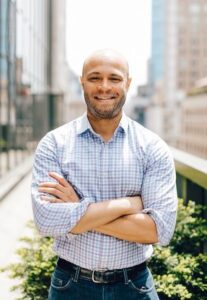
In a single sentence, why are you running for Mayor?
I am uniquely positioned to make a difference in Denver, a city which needs a leader who is willing to confront the real challenges our city faces, and make the tough decisions our city needs to get back on track – my background as a small business owner lends me the background needed to do this.
What do you think are two of the biggest challenges impacting women in the workforce? How would you address these?
Unaffordable childcare is a huge issue for many families in Denver, and a disproportionate share falls on the share of women. As the next mayor of Denver, I will work with our state representative to streamline the regulations for professional childcare, working to make it easier to for childcare providers to operate in Denver. Further, I will also offer new city services to prospective childcare providers helping them to navigate the regulatory process and offer services.
Another key issue for women in the workforce is being equally considered for management and leadership roles. As the next mayor of Denver, I intend to set an example for the city of Denver in ensuring that women serve in a wide range of leadership roles across my administration.
What can be done to attract women and BIPOC women led businesses to Denver? How can Denver continue to support existing women and BIPOC led businesses?
As a business owner myself, I am very familiar with the challenges facing small businesses in Denver, especially for BIPOC members of our community. As a city, we must be better prepared to help our small businesses succeed. As mayor, I will create a city fund for seed and emergency capital for locally owned businesses. This capital will be provided with low interest rates and mandatory timelines for efficient deployment. And it will help foster businesses aligned with our Denver neighborhoods.
We need to provide city resources so that each neighborhood maintains its cultural identity. Historically black neighborhoods have seen their businesses close. Other ethnicities are facing similar fates. As a neighborhood mayor, one of the issues we will collaborate with our residents on is how to preserve and create minority owned businesses. We will use city resources to facilitate.
Further, I’ll seek to influence large Denver-based organizations to become “anchor institutions” via leadership and partnership incentives. Anchor institutions will pledge to source goods, workers, and IT from Denver neighborhoods and small businesses.
The pandemic significantly shifted the business landscape in Downtown Denver. What do you think can be done to attract and keep businesses in Denver?
As the CEO of a business with multiple Denver locations, I am particularly aware of the challenges that the pandemic has presented to Denver’s downtown. But now that the pandemic is behind us, we are still seeing downtown being far less active than it was before. The biggest blocker for downtown getting back to where it was is public safety and homelessness. The next mayor has to address these problems and they can no longer be ignored. It’s especially urgent because we are finding ourselves in a vicious cycle where retail shops closing only makes these problems worse.
My focus as mayor will be on improving public safety and addressing homelessness in a compassionate yet effective manner. This means increasing the number of police officers and homeless outreach workers on the streets, creating safe spaces for people experiencing homelessness to access services, and enforcing the camping ban to ensure that our public spaces are clean and accessible to all.
As part of my Neighborhood Plan, I will direct the Police Department to implement more neighborhood policing, where police officers will be assigned to neighborhoods and implement policing polices aligned with the diverse needs of Denver’s many neighborhoods.
The cost of living in Denver has increased dramatically in recent years, which impacts single-parent/caregiver and single-income homes at greater rates. If elected, how would you address the issue of housing affordability and the cost of living?
As a Denver native, I have seen firsthand the incredible growth and change that has taken place in our city. This has been amazing for the city but has come with growing pains, and I believe that the biggest issue Denver faces over the long term is housing affordability and making sure our neighborhoods work even as Denver grows.
Housing affordability is a critical issue that needs to be addressed in order to ensure that all Denver residents have access to safe, affordable housing, which in turn is what will make our neighborhoods and local economy work. As mayor, I would work to implement policies that make it easier for developers to build more housing units in our city. I will streamline the permitting process, improving it where necessary, creating processes that help bring more housing units online quickly.
In addition to housing affordability, we need to make sure that our neighborhoods work. This means investing in our transportation infrastructure, including public transit, bike lanes, and sidewalks, to make it easier for people to get around without being reliant on cars. And then the other component of making our neighborhoods work is making sure people feel safe – crime has increased and I will work tirelessly as mayor to implement neighborhood policing policies with DPD to help ensure that our police department is more responsive and effective to the needs of our neighborhoods.
As you build your leadership team, what would your plan be to build a well-rounded cabinet of advisors to support an inclusive city?
As a business leader who is deeply involved in our community, I know that being able to bring together a diverse set of voices is a necessary component of good leadership. As the CEO of Tattered Cover, I was able to bring people together to put the business back on track, and a key part of my job is to offer the city of Denver a focal point that brings together people with many ideas and viewpoints. The previous ownership created a wedge in our community that only leadership focused on listening and creating a sense of belonging could help heal.
Renate Behrens – No Response
Chris Hansen chrisfordenvermayor.com
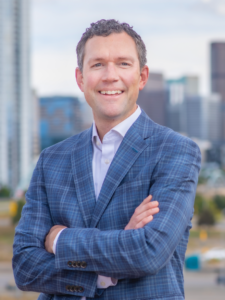
In a single sentence, why are you running for Mayor?
I am running for Mayor because we need to build a city that works and as Mayor, I will make Denver safer, more affordable, and greener and focus on improving the public safety department and enforcing the camping ban.
What do you think are two of the biggest challenges impacting women in the workforce? How would you address these?
There are many challenges facing women in the workforce and the top two that women and advocates identify in conversations I’ve had recently are pay equity and flexibility for mothers-to-be and mothers–including concerns about work-life balance. In order to make the workplace more inviting for women, it is essential to offer flexible arrangements and hybrid work when possible and to take work-life balance concerns seriously.
What can be done to attract women and BIPOC women-led businesses to Denver? How can Denver continue to support existing women and BIPOC-led businesses?
I have a long record of supporting state investments in BIPOC businesses and I want to continue that at the city level because it strengthens Denver. Addressing affordability in Denver is also key to attracting women and BIPOC women led businesses to Denver. If folks feel like they can’t afford to live here due to housing and childcare costs, and a public education system that is underperforming, then we are not going to attract these important individuals and businesses to Denver. However, we can make Denver more inviting by building substantially more housing stock, which will bring down housing costs. Additionally, we can invest in women owned businesses with grant programs and mentoring programs that connect them with the existing network of women owned and BIPOC women owned businesses in Denver.
The pandemic significantly shifted the business landscape in Downtown Denver. What do you think can be done to attract and keep businesses in Denver?
With enhancing public safety as my top priority, I know we can revitalize downtown. We will focus on growing the downtown economy, using placemaking strategies that make downtown more inviting, expanding housing opportunities, and capitalizing on downtown’s cultural, civic, and entertainment assets to further support the vibrant environment needed for a thriving city center. We know that increasing population density downtown brings safety benefits because the presence of people deters criminals, so I am excited to see the impact of the Elitch Gardens redevelopment, among other projects that are currently underway. Denver has made great investments from Union Station to RiNo, and now we need to focus on connecting them thoughtfully and enforcing our laws.
The cost of living in Denver has increased dramatically in recent years, which impacts single-parent/caregiver and single-income homes at greater rates. If elected, how would you address the issue of housing affordability and the cost of living?
We must quickly build more housing along transit corridors. We need 50,000 new units and we need to provide options at every price point. Denver housing has been shaped by siloed zoning, delayed permitting and developed without taking advantage of the benefits of close coordination with transit development. As a result, we have dispersed development and insufficient transit options. We need systemic solutions to realize the benefits of combined housing and multimodal transit: an interconnected and easily traversable city with tens of thousands of additional housing units. As Mayor, I will expedite permitting for affordable housing projects and make sure we have a special team that fast tracks projects that are funded with federal funds and state funds, so we can build the thousands of new units we desperately need quickly.
As you build your leadership team, what would your plan be to build a well-rounded cabinet of advisors to support an inclusive city?
Denver’s next Mayor is only successful if they can build a great team. As Mayor, I will assemble a cabinet that represents Denver’s different neighborhoods, and has a mix of folks with private and public sector backgrounds. This is not a campaign promising anyone cabinet spots, instead Denver deserves an open and transparent process to build the best team to serve the city’s needs. Throughout my seven years in the state legislature, I’ve had the opportunity to meet so many capable and wonderful people from all over the metro area, so I have a solid rolodex of folks who are engaged in high-level problem solving. Additionally, my years of experience in the corporate world before I ran for office informed my understanding of what it takes to build a great team. I will be sure to cast a wide net and make working for the city government attractive to folks from all walks of life.
Mike Johnston mikejohnstonformayor.com

In a single sentence, why are you running for Mayor?
I’m running for mayor because I believe in the City of Denver and I know that my long track record of bringing broad coalitions together to fix the city’s toughest problems will propel Denver into the affordable, safe, and vibrant city that we know it can be.
What do you think are two of the biggest challenges impacting women in the workforce? How would you address these?
One of the biggest challenges for women in the workforce is a lack of access to affordable childcare. As Mayor, I will address this challenge by incentivizing on-site child care in the workforce, driving prices down and access up. The second challenge that I see impacting women in the workforce is the slow growth of wages compared to those of men. Not to mention, the further disparities between women of color in the workforce and men increases the difficulty for these groups to afford the ever increasing cost of living in our city.
What can be done to attract women and BIPOC women-led businesses to Denver? How can Denver continue to support existing women and BIPOC-led businesses?
Small businesses are the heart of our economy here in Denver, and as Mayor I will work closely with entrepreneurs, investors, and the city to support women and BIPOC led businesses. Denver needs to be an aggressive direct investor in women led businesses and needs to be a convener and catalyst for investment from other private and philanthropic investors in the city. Under my equity plan, I will ensure the city is betting on our small businesses by increasing access to city funding for women and minority owned businesses. I’ve also committed to regularly convening philanthropic and business leaders across the state who are interested in elevating the voices of small business via direct equity investments and grants. Allowing these businesses to flourish financially will support both the owners and give them the capacity to hire more employees and pay them higher wages to support women in the workforce. Read my full equity plan here: https://mikejohnstonformayor.com/issues/equity/
The pandemic significantly shifted the business landscape in Downtown Denver. What do you think can be done to attract and keep businesses in Denver?
The mayor’s central role is to create and maintain an ecosystem that encourages business to thrive. That means actively working to recruit new headquarters to downtown, it means helping businesses that are currently here get access to the resources they need to succeed, and it meant being more aggressive in investing in early stage entrepreneurs, particular woman and minority-led businesses to help them get from idea to launch without oppressive regulatory burdens and long wait times. As Mayor, I will lead the charge to encourage businesses to return in person by first doing the same with city workers and then encouraging others to follow suit by providing incentives such as downtown childcare facilities and discounted and free public transit. I will also move aggressively to house people who are unhoused through micro communities and will put 200 more first responders on the street, including law enforcement officers walking the beat, to make downtown Denver more safe and open for business.
The cost of living in Denver has increased dramatically in recent years, which impacts single-parent/caregiver and single-income homes at greater rates. If elected, how would you address the issue of housing affordability and the cost of living?
Denver is quickly becoming a city that only the rich can afford, and the nurses, firefighters, and workers who serve our city every day are being priced out. As Mayor, I plan to make affordable housing a top priority to ensure that Denver can remain a diverse flourishing city for years to come. The single parents who make our city great will be able to afford to live here. I spent the past two years traveling around the state and the country working with housing experts and visiting cities that were doing a much better job solving the housing crisis, hoping to bring home a solution that can work for all Denverites. My plan for affordable housing will utilize funds made available through Prop 123 to do the following:
– Create over 25,000 permanently affordable units so teachers, nurses, and firefighters can live in the city they serve.
– Cut the regulatory red tape by requiring the City of Denver to approve affordable housing permits within 90 days.
– Prevent rent increases so that eligible Denver residents won’t pay more than 30% of their income to rent.
– Build mixed income developments that ensure a healthy mix of market rate and affordable units and create diverse neighborhoods.
– Put money in people’s pockets by helping renters in eligible units save up to $100 every time they pay rent.
– Provide down payment assistance to help working families buy homes and support community land trusts to make buying a home more affordable.
You can read my full detailed plan and budget here: https://mikejohnstonformayor.com/issues/housing-and-affordability/
As you build your leadership team, what would your plan be to build a well-rounded cabinet of advisors to support an inclusive city?
I’ve committed to having the most diverse cabinet of world-class leaders of any mayor. I am proud of the fact that I have built diverse successful teams in every venture I have led over the last 20 years, and I will ensure my cabinet of advisors looks like the city we are serving. I will look across the city and across the country to find the best talent to help run the city, and I will intentionally hire out of communities who are directly impacted by the city policies.
James Walsh – No Response
Ean Thomas Tafoya tafoyaformayor.com

In a single sentence, why are you running for Mayor?
I’ve been fighting for our underserved communities for decades, and we deserve leaders who will take that fight to the Mayor’s Office.
What do you think are two of the biggest challenges impacting women in the workforce? How would you address these?
One major challenge is wage exploitation. Wages are not keeping up with the cost of living, especially for women. Women in particular feel the worst impacts of that exploitation, and women of color experience it most acutely. Women deserve access to worker power, worker organizing and unions to fight back against wage exploitation. Many employers attempt to bust, disrupt and retaliate against organizers trying to unionize. We need to support our workers especially in women dominated professions. We also need to work with unions to increase women in membership and leadership, and make it easier and safer for women to access the trades. For example I would like to invest in workforce development and apprenticeships in renewable energy, and I think providing childcare is a crucial way to make it more accessible to working mothers. We need to lead by example in the Mayor’s Office by supporting the unionization of our public workers.
Another major challenge is sexual harassment, which disproportionately impacts women of color and workers in homecare industries. A big piece of combatting sexual harassment is building power among workers, so they do not feel beholden to a particular job or employer to survive. This makes it easier for women to report, go to the Equal Employment Opportunity Commission, or leave an unsafe workplace. We also need to lead by example in the Mayor’s Office, conducting prevention training that has been proven to reduce workplace violence and responding immediately and strictly to any misconduct. I would love to work with the Women’s Chamber of Commerce and other organizations about how we can more systematically combat discrimination and harassment women face in the workplace.
I want to elaborate on a third challenge, which is the attacks across the country on trans women in all professions. Nationwide, there are bills being proposed and even passed that essentially make it illegal for trans women to even exist in many professions, from healthcare to teaching. In Denver we need to stand strong against these attacks against the LGBT+ community and include trans women in our fight for women in the workplace.
What can be done to attract women and BIPOC women-led businesses to Denver? How can Denver continue to support existing women and BIPOC-led businesses?
One big piece is rent control. High cost of space is a major barrier to women and BIPOC women opening new small businesses.
Second, I have a long track record of working closely with small businesses and would continue to build those relationships as Mayor. We need to come together to identify barriers to accessing existing resources, and create new resources–from financial literacy to outright grants–for small women and BIPOC owned businesses. The City should also make every effort to work directly with women owned and BIPOC owned businesses with the highest labor standards.
We also have to include small businesses and their workers in policy conversations. For example, minimum wage is not keeping pace with the cost of living in Denver, but our small businesses are also being strained by costs. Let’s have a conversation about what policies can work best to address these two challenges together. How do we uplift co-ops and worker-owned businesses? What policies can support both communities?
The pandemic significantly shifted the business landscape in Downtown Denver. What do you think can be done to attract and keep businesses in Denver?
The biggest thing we can do to keep businesses in Denver is support Denverites starting and keeping small businesses. This includes passing rent control to keep lease costs down, specifically supporting local entrepreneurs and using the platform of the Mayor’s Office to promote small local businesses.
The other policies we can pursue downtown are the same policies I believe will help the whole city.
First, we need to pursue solutions to homelessness that are compassionate and data-driven. Lots of research shows the fastest, cheapest way to get people off the streets is to get them into housing with wraparound services. In 2020, I presented a community plan that leveraged regional cooperation to rapidly get folks off the streets into safe outdoor spaces and temporary indoor homes, and as Mayor I would implement it while expanding programs that have actually been proven to work in Denver. We need public restrooms downtown as well, so that small businesses aren’t overburdened or so small businesses can actually own restrooms and get paid by the city to keep them public.
Second, we need to electrify and expand public transit, so that people from everywhere in the city can easily come downtown using the bus. This will decrease downtown traffic, air pollution and traffic deaths. Downtown will also then be safer for bikers and pedestrians.
Finally, we need to invest in the arts and culture of downtown, increasing grants and opportunities to artists–especially women artists and artists of color.
The cost of living in Denver has increased dramatically in recent years, which impacts single-parent/caregiver and single-income homes at greater rates. If elected, how would you address the issue of housing affordability and the cost of living?
First, we need to make sure people can stay in the homes they have by passing rent control, instilling a vacancy tax and expanding tenant protections.
Then, we need to expand transitional housing programs and housing that seniors, the disabled and working families can all afford. I served on the Inter-neighborhood Cooperation Zoning & Planning Committee, Blueprint Denver, and the taskforce implementing Colorado’s first inclusionary zoning law. It’s time to take that experience to the Mayor’s Office and push things further. We need heavy requirements and incentives for building units for people making between $0-$60,000 a year, allow commercial zoning to become residential and ease permitting so people can build on single-family homes to fit more people.
All this housing construction is a huge opportunity for that construction to be sustainable. It’s also an opportunity to invest in local workforce development and contracting local businesses with the highest labor standards.
As you build your leadership team, what would your plan be to build a well-rounded cabinet of advisors to support an inclusive city?
Diversity in leadership is key, because we need to gather as many perspectives as possible in order to serve our diverse city. I would make an effort to include advisors of all races, genders, sexual orientations, ethnicities and faiths. We need to recruit leadership in the disability community, multilingual leadership, leadership from different neighborhoods in Denver. We need leaders of different ages, including our elders and our youth. We need leadership with different professional backgrounds and expertise. My current campaign team has more women than men and that’s something to build on for an administration.
What is most important for my team, regardless of identity, is a strong record of fighting for underserved communities in Denver, a commitment to equity and a theory of change that the people of our city should lead the way. We need leaders who will address the systemic barriers to women in business and in the workplace.
Andy Rougeout andyfordenver.com
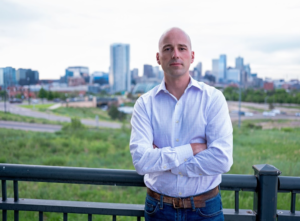
In a single sentence, why are you running for Mayor?
I am running for Mayor to Fight for Denver’s Future by reducing crime, homelessness, and the cost of housing in our city.
What do you think are two of the biggest challenges impacting women in the workforce? How would you address these?
There are many challenges facing women in the workforce. My wife has faced several in her career, and I worry my daughters will face them as well. One area I can impact as Mayor is safety at the workplace. As Mayor, I will add four hundred police officers, increase funding for police training, and ensure our 911 system is responsive to make our city safer. I will also work to make our city more affordable, by fixing a broken permitting department and eliminating regulations that increase the cost of housing for blue collar workers, young families, and first time home buyers.
What can be done to attract women and BIPOC women-led businesses to Denver? How can Denver continue to support existing women and BIPOC-led businesses?
As a former small business owner, I saw the roadblocks thrown up by our city for entrepreneurs of all types. As Mayor, I will eliminate barriers that reduce access to capital and business formation in our city, including streamlining the process for certifying as a women owned business.
The pandemic significantly shifted the business landscape in Downtown Denver. What do you think can be done to attract and keep businesses in Denver?
Downtown needs to be safe for it to thrive. As Mayor, I will add four hundred police officers, increase funding for police training, and ensure our 911 system is responsive to make Downtown safe and business friendly.
The cost of living in Denver has increased dramatically in recent years, which impacts single-parent/caregiver and single-income homes at greater rates. If elected, how would you address the issue of housing affordability and the cost of living?
As Mayor, I will work to make our city more affordable by fixing a broken permitting department and eliminating regulations that increase the cost of housing for blue collar workers, singe parents, and single income households.
As you build your leadership team, what would your plan be to build a well-rounded cabinet of advisors to support an inclusive city?
My cabinet will reflect the diversity of our city, and be composed of the best and brightest to ensure we are effective in Fighting for Denver’s Future by reducing crime, homelessness, and the cost of housing.
Leslie Herod leslieformayor.com
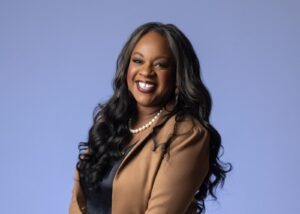
In a single sentence, why are you running for Mayor?
I am running for Mayor because I believe that Denver is ready for a leader with a bold vision who will bring people across the city together to get real results.
What do you think are two of the biggest challenges impacting women in the workforce? How would you address these?
Women were disproportionately impacted by the pandemic, working fewer hours or leaving the workforce altogether. While employment rates for women have rebounded in the past three years, the gender pay gap, occupational segregation, and caregiving disparities continue to harm women in the workforce.
As Mayor, I will ensure that any person who works for the city is valued. Women, and especially women of color, are starting businesses at a higher rate than ever before, but are under-funded and lack support to thrive as entrepreneurs.
What can be done to attract women and BIPOC women-led businesses to Denver? How can Denver continue to support existing women and BIPOC-led businesses?
Equity in contracting will be a distinctive value in my administration. Our minority, women and disadvantaged-small businesses must feel supported and given ample opportunity to work with the city and its partners.
Our Office of Social Equity and Innovation will convene a working group with the Hispanic, Black, Women, Asian, and LGBTQ+ chambers and contractors associations to discuss how the city can best support minority businesses and contracting.
We will partner with organizations like SistahBiz, the Commons on Champa, Mi Casa Resource Center, and the New Community Transformation Fund to increase access to funding and training for minority and women-owned small businesses.
The pandemic significantly shifted the business landscape in Downtown Denver. What do you think can be done to attract and keep businesses in Denver?
Denver’s economic development future rests on its ability to educate, train, attract and retain talent. For the first time in 20 years, more people are leaving the Denver Metro area than moving here. This is due in part to employment challenges. However, this is also due to our safety and housing affordability challenges. My economic development platform centers on creating a safe, strong and vibrant Downtown Denver; making city government more efficient through accountability; small business advocacy and equity; and making Denver a Global Gateway City.
Within my first 100 days, I will meet with the City’s largest employers and fastest growing companies to discuss the challenges and opportunities facing their businesses. I will also partner with the Metro Denver Economic Development Corporation, higher ed, and upskilling organizations to ensure we are training and educating the next workforce to meet employer and employee needs.
The cost of living in Denver has increased dramatically in recent years, which impacts single-parent/caregiver and single-income homes at greater rates. If elected, how would you address the issue of housing affordability and the cost of living?
Housing affordability impacts everyone, and costs are quite simply out of control in Denver right now. We need a multi-pronged approach to this crisis that ensures that current renters and homeowners can afford to live here, while ensuring our unhoused neighbors have access to both housing and supports to help get them back on track. I will fight for resources to create truly affordable housing and end chronic homelessness, zoning reforms to prioritize fair housing and affordable homes for families, protections to stabilize tenants, and ways to expand permanent affordability, such as community land trusts.
As you build your leadership team, what would your plan be to build a well-rounded cabinet of advisors to support an inclusive city?
I believe the strength of my team will be dependent on the diversity of their backgrounds and experience. I want different opinions at the table because that will make us stronger and more effective. We will attract the best and the brightest appointees from both local talent and across the nation. As I committed at a press conference where over 59 women elected officials and community leaders endorsed me, I will have a majority of women leaders in my cabinet. I will be the first woman mayor of Denver and that comes with great responsibility. Continuing to surround myself with strong women will be at the cornerstone of the Herod Administration.
Robert Treta – No Response
Deborah “Debbie” Ortega debbieortega.com
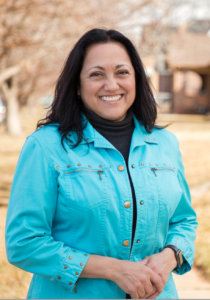
In a single sentence, why are you running for Mayor?
Now more than ever, Denver needs a leader who can hit the ground running on day one to solve the challenging issues we face; I spent my entire professional life serving this city and know its inner workings and am the only person in this race with the necessary experience to get our beloved city back on track.
What do you think are two of the biggest challenges impacting women in the workforce? How would you address these?
As a working single mother myself, I can attest to the acute need for affordable housing and childcare that has only grown in recent years.
To address the crisis of unaffordable housing, a comprehensive approach is required, including job connection, public transportation, childcare, and much more.
The Expanding Housing Affordability ordinance created by City Council begins to address housing attainability by expediting permits for affordable units, but more work is required to fix Denver’s broken permitting process so that affordable housing can be brought online more efficiently.
Additionally, we need to invest more strategically in alternative housing, including single room occupancy (SRO) units, co-housing modular homes, repurposing vacant units and/or commercial buildings, and ADUs. We should also identify vacant public lands for manufactured housing at 40% cheaper than on-site new construction. Solving our housing needs also requires regional solutions.
As for child care, I helped lead the citizen-adopted Denver Preschool Program, which provides tuition credits to Denver families for Pre-K childcare.
However, access to licensed facilities is not meeting the growth of our population, and staffing shortages provide an additional challenge, which must be addressed, especially in low-income neighborhoods.
As mayor, I’d look to incentivize nonprofits and other organizations to lease out portions of their facilities to help accommodate the demand for child care services (I have been referencing HB22-1006 (Child Care Center Property Tax Exemption) at the state level to see what we can do here in Denver.)
What can be done to attract women and BIPOC women-led businesses to Denver? How can Denver continue to support existing women and BIPOC-led businesses?
We need to ensure that women who want to work in Denver can afford to live in Denver. This starts with leading policies that will decrease the cost of housing, like expanding our housing stock through alternative housing (modular, repurposing vacant units and/or commercial buildings, and building out accessory dwelling units and single room occupancy units).
Additionally, I’d take a balanced approach in ensuring that the Herman Malone Fund would provide innovative resources for women and BIPOC-owned businesses to leverage , so they could make investments in new property and equipment while hiring new staff, leading to jobs, economic growth, and tax revenues.
A couple additional steps, among others, would include access to low interest loans, technical assistance and promoting (through Visit Denver & city newsletters) BIPOC businesses to help activate these businesses. Small businesses are the lifeblood of our city and contribute taxes that are used for our essential city services.
The pandemic significantly shifted the business landscape in Downtown Denver. What do you think can be done to attract and keep businesses in Denver?
I remember the days when downtown Denver was the heart of the city, with downtown residents, bustling shops and businesses, thriving restaurants, and venues and activities for friends, families, and conventioneers to frequent.
We need downtown, our economic engine, to be that place again. With residents leaving and so many businesses having shuttered their doors due to challenges associated with the COVID-19 pandemic and increased public safety concerns downtown, I plan to take two immediate steps to attract and keep businesses not only in Downtown, but the city more broadly.
I will partner with government agencies, business organizations, and private sector groups to restore and activate Downtown Denver. This will be achieved through immediate revisions to our permitting process so it’s easier to locate new businesses downtown. Denver has provided funding to the Downtown Denver Partnership to help fill in and activate vacant storefronts on the 16th Street Mall. I will also remove outdoor encampments and connect people to resources that meet their needs.
With public safety in mind, I plan to work with neighboring jurisdictions to create a Metro Crime Task Force focused on stopping the flow of deadly drugs into our communities. I will also invest into personnel recruitment and retention supporting our public safety departments so they can strategically allocate resources that address all illegal activities (gun violence, car thefts, etc) that take place downtown and across our city. I will continue funding for Denver’s Support Team Assisted Response (STAR) Program so qualified mental health professionals can resolve nonviolent scenarios while the police can focus on keeping us safe.
The cost of living in Denver has increased dramatically in recent years, which impacts single-parent/caregiver and single-income homes at greater rates. If elected, how would you address the issue of housing affordability and the cost of living?
Denver’s skyrocketing cost of housing is pricing out far too many working people out of Denver. As a result of this trend, we face labor shortages, disruptions to our businesses across the city, and lose what makes our city so special: its people. Our small and local businesses – along with the city’s broader economy – depend on a thriving workforce who can afford to live in the city it helps support.
Having served on the Business, Arts, Workforce & Aviation Services Committee, I have helped advance several initiatives seeking to prop up our employees and workforce. For example, a colleague on the City Council and I are leading an upcoming ordinance that will set goals for local hire and apprenticeship hires so that the city can foster a job-creating pipeline for skilled trades. Should this initiative pass, Denver can begin alleviating staffing shortages while creating good-paying jobs that will help employees grapple with the increased cost of living.
Additionally, I supported CB19-1237 (A Livable Wage for Denver), which passed with the support of the members from the business community, to ensure that annual wage increases are tied to the Consumer Price Index – helping ease the cost of living for people across the city.
When elected, I will invest more strategically in alternative housing, including modular homes, repurposing vacant units and/or commercial buildings, and ADUs.
We should also identify vacant public lands here in Denver, and neighboring jurisdictions, for manufactured housing at 40% cheaper than on-site new construction.
As you build your leadership team, what would your plan be to build a well-rounded cabinet of advisors to support an inclusive city?
Having led the first LGBTQ equal protection ordinance in Denver’s history, advancing equity, inclusion, and a diversity of perspective is a cornerstone of my work.
When elected, I will ensure that my cabinet not only reflects the diversity of our city, but will select experts to lead our agencies that are committed to working together, along with our business and neighborhoods to solve Denver’s challenging, yet solvable problems.
Kelly Brough kellybrough.com

In a single sentence, why are you running for Mayor?
I’m running for mayor to restore the promise of Denver for all of us by addressing homelessness, improving community safety, and delivering more housing that is affordable.
What do you think are two of the biggest challenges impacting women in the workforce? How would you address these?
Women have faced challenges in the workplace for generations, but I truly believe that the COVID crisis was both a set-back for working women and wake-up call for the need to rethink our policies (public policies and corporate policies) to better support working women. I believe the top two challenges impacting working women today are (1) lack of affordable, accessible child care and (2) pay inequity. Here are my thoughts about the opportunities for Denver’s next Mayor to address both:
– Child Care – Child care is both very expensive (more expensive in fact than the average in-state tuition for higher education) and hard to find. In 2006 Denver became one of the first cities in the country to dedicate local tax revenue to support early care and education through the Denver Preschool Program (DPP). DPP has been incredibly successful, investing more than $150M to help pay for preschool for more than 65,000 children since 2007. DPP serves all children in the year before Kindergarten (typically 4 year olds) and some three year olds. DPP is currently scheduled to sunset in 2026. As part of the reauthorization of DPP, I would be interested in exploring the possibility of using the DPP model to help working parents pay for infant and toddler care as well. To the point of child care being hard to find, I’d love for the city to partner with employers to help encourage and support more employer-based child care programs. I look around at all the vacant and underutilized office space in Denver and believe there is real opportunity to expedite the transition of some of that space to child care facilities, expanding capacity of licensed care providers and doing it in locations that are close to where parents are working. I see tremendous opportunity for public-private partnerships to make that happen.
– Pay Inequity – According to the Pew Research Center, in 2022, women earned just 82 percent of what men earned, based on analysis of median hourly earnings of both full-time and part-time workers. Similar analysis from the Center for American Progress shows that this gap is even larger for women of color. For example, in 2020 Hispanic women earned just 57 cents for every $1 earned by white, non-Hispanic men and Black women earn just 64 cents for every $1 earned by white, non-Hispanic men. This has to change – but it won’t change through legislation or policy. It has to change because leaders demand it in our own organizations and we begin to compete for talent precisely because we make a commitment to address such inequities.
I will say that I believe that representation and role modeling matters. I am incredibly proud to be one of five women in this field of candidates for Mayor. I think there is a strong possibility we could have two women in the run-off of this race and I believe it is likely that Denver will elect its first female mayor this year. This is long overdue, but still really meaningful and not something that should be overlooked.
What can be done to attract women and BIPOC women-led businesses to Denver? How can Denver continue to support existing women and BIPOC-led businesses?
Minority and women-owned businesses do not start or succeed at the same rate as those owned by white men. There are often unique barriers they face in terms of unlocking capital and building the professional networks necessary to identify opportunities for growth, develop referrals, recruit talent, etc. As CEO of the Denver Metro Chamber of Commerce, I was responsible for the Denver Metro Small Business Development Center. During my tenure, we were recognized as best in the nation. I also launched an initiative at the Chamber called Prosper Colorado where we specifically helped entrepreneurs who were women and people of color access the resources and supports necessary to thrive. As Mayor I’ll continue this work, with a focus on cutting red tape and providing small businesses with access to city contracts. One specific focus could be to create one application for all public sector partners (CDOT, RTD, DPS, City) which would allow small businesses to qualify as MBE/WBE/DBE for purposes of contracting.
The pandemic significantly shifted the business landscape in Downtown Denver. What do you think can be done to attract and keep businesses in Denver?
The successes and struggles of downtown Denver impact the entire region and the entire state, so it is critically important that the next Mayor of Denver makes the revitalization of downtown a key priority. Revitalizing downtown starts with making sure our residents and visitors feel safe. I will focus on filling the approximately 150 vacancies in Denver Police Department and expanding the co-responder and STAR programs, so we free up sworn officers to focus on real crime, while providing residents in crisis with more appropriate support. Second, we must meaningfully address homelessness. My plan to end unsanctioned camping within my first year in office by focusing on housing and sheltering and taking a data-driven, regional approach has been endorsed by five metro-area mayors. Third, I will begin immediately working with private sector partners to convert some existing downtown office space to residential to ensure activity in the urban core seven days a week, 24 hours a day, 365 days a year. Finally, my administration will do our part to ensure successful completion of the 16th Street Mall revitalization project. As the backbone of our downtown, this is a critical priority and exciting opportunity for our city that I will champion.
The cost of living in Denver has increased dramatically in recent years, which impacts single-parent/caregiver and single-income homes at greater rates. If elected, how would you address the issue of housing affordability and the cost of living?
As a single mom myself, this question really resonates for me. All people who work in Denver should be able to afford to call Denver home. But for too many Denverites, housing costs are a significant burden, and for many more, costs are so high that they can’t afford to stay in the neighborhoods they raised their kids. We need housing solutions that benefit people across the income spectrum, particularly for hard working people who earn too much to qualify for most public assistance programs but struggle to make ends meet with the high cost of living in Denver today. My plans to ensure more housing – for rent and for sale, market-rate and subsidized – include:
– The city will build more housing on underutilized, publicly owned land.
– Rethinking and revitalizing downtown and surrounding neighborhoods by incenting and supporting the transition of commercial space to residential.
– Increasing density on major transportation corridors and at transit stations and working with homeowners to facilitate options that enable them to maximize value of their property.
– Fundamentally restructuring how development is reviewed and regulated in Denver.
In addition to housing, transportation and child care are the two other major affordability challenges for Denver. The City must develop a stronger, more effective partnership with RTD to maximize the value of our transit infrastructure, investing in first-mile and last-mile connections to make transit a more attractive and viable option. With regard to child care, we’re fortunate to have the very successful Denver Preschool Program, which ensures access to preschool for all 4-year-olds and some 3-year-olds. As mentioned above, I’d be interested in exploring the possibility of DPP expanding to help with infant and toddler care and learning more about ways the City can partner with downtown employers to make child care more accessible in our city center through the conversion of vacant and under-utilized commercial space to child care.
As you build your leadership team, what would your plan be to build a well-rounded cabinet of advisors to support an inclusive city?
My best hiring decisions have always been made when I convene diverse stakeholders to help me to identify the critical skills, background and skills needed to be successful in the role and the top talent to meet those needs. I will invite Denver to help do just that. I will engage our community – civic, business and nonprofit leaders, elected officials and City employees to help identify top talent and key issues each department must address.
My administration will reflect the diversity of our city in every way: race, ethnicity, gender and also political orientation and ideology. The best teams are those that reflect multiple points of view and respectfully and constructively compete to advance best ideas and challenge each other’s (and my) thinking. I will recruit widely and ask those engaged in this process with me to consider life experience as equal to educational credentials and more traditional work experience. This is the exciting part because the success of our City depends on getting the right team in place to lead us forward.
WRITE-IN CANDIDATES
Paul Noel Fiorino fiorinofordenver.com

In a single sentence, why are you running for Mayor?
To help our Seniors, Veterans, Students and FAMILIES
What do you think are two of the biggest challenges impacting women in the workforce? How would you address these?
Pay Equity would improve with Write in FIORINO for Denver Mayor. R.E.S.P.E.C.T.
What can be done to attract women and BIPOC women led businesses to Denver? How can Denver continue to support existing women and BIPOC led businesses?
Identifying our strength in Hospitality and Tourism industry our largest Workforce may be Unions of representatives from throughout the City, County and State. Fiorino for Mayor may be the strongest candidate for the diversity of BIPOC in the administration. The Public Safety Department will also recruit and train with the new emphasis on mental and physical health. My dear Mom had an incredible life (Madeleine Turgeon Fiorino 1925-2021) a woman who brought music from Canadian roots with Opera, through her Choirs and many a musical adventure with me. Dr Antonia Brico was piano lessons, chorus and the strict dedication to Music. Central City Opera my first paycheck and the Jose Greco concert with Dad ( Emilio Edward Fiorino 1925-2021) set the Flamenco for the future, and the audition for Fiddler on the Roof; led to Nutcracker working with young women throughout career with respect.
Cleo Parker Robinson Dance Ensemble. (Currently ADA Restrictions), was my immersion into ethnic modern dance. the company’s experience as the first token, I would go East to excel in a diverse and inclusive career, with a strong foundation from Cleo and others, I owe GRATITUDE for my perseverance, technical, management and people skills through Arts Education, Performance and Production; bringing the best of talent together.
My Small Business in the Golden Triangle Museum Creative District will presume to hire faculty upon obtaining facilities for Ballet Arts Theatre. The production that can be seen online Peter & The Wolf presentation Theater in the Park, with Denver Municipal Band. WRITE In Fiorino for Denver Mayor on your Ballot so I may honor mine and yours.
The pandemic significantly shifted the business landscape in Downtown Denver. What do you think can be done to attract and keep businesses in Denver?
Destination Denver is the plan. And they will continue to come. Downtown must be welcome
To the stranger as we can give the best experience in hospitality for those coming and going or those who choose our great City to live and work. Universal Basic Income could also be in form of a way to increase our economy by and for those on the mall, or near in need. The Alley reeks because we need restrooms, for all, installed on Wagon or permanent. Dress up the empty shops with a Sister Cities adventure with windows covered with information or visual Arts. The security forces are ESSENTIAL but we can’t just lay on the walk, we get them the help, UBI, or incentives to clean up, fix up and get on a pathway away from addiction. I ride regularly through and around, and I see it first hand and call a Responder for the humanity of the tragedies people experience, I too know some of it myself.
Fiorino is the name for Mayor. Please write in Fiorino for Denver Mayor. Vota Voto Vote.
The cost of living in Denver has increased dramatically in recent years, which impacts single-parent/caregiver and single-income homes at greater rates. If elected, how would you address the issue of housing affordability and the cost of living?
Rent control or Universal Basic Income or tax credits will need to be initiated upon application. The Denver Bank, to be established, is based on the North Dakota’s model with further quantitative easing, for micro loans and grants. This I have proposed since my 2006 Gubernatorial as a bank for Colorado cannabis industry and other small businesses unable to obtain financial assistance. Seniors, Veterans and Families need more attention than most. Caregivers are the salt and sweet of the world, and I look forward to assisting them with all they may need. The nonprofit sector I continue to support along with Federal and State funds that are there.Let me go get them for you and yours. Write In on the blank line on the mail in ballot FIORINO, then sign, seal, deliver, I’m yours! #votefiorino
As you build your leadership team, what would your plan be to build a well-rounded cabinet of advisors to support an inclusive city?
The diversity of Candidates is impressive for the fact that they will even put themselves into such a position, in order to obtain the position of Denver Mayor. A Mayor Fiorino knows them, as he studied those who helped us get into this mess. Fifteen years of campaigning gives Paul Noel Fiorino the experience and Seniority among all the candidates. But more importantly would be a nonpartisan policy maker, Unaffiliated candidate and former Union member, Small Business Owner, University Faculty and Parent of two adults; so free time.
Mayor Fiorino would cast the crew, Team members from those who would be best for the job. Cabinet members, advisers would include opportunity for Denver Citizens to return.
Fiorino is a choreographer, director can cast appropriately, then direct the process to success. Plans have been made, but yet seeing much progress; The ideas also that have come out of this campaign, can change the dynamics of Denver Colorado, Capitol City.
As a producer with music and the video made for Women’s March THEY CAME FROM ALL AROUND, available on DenverColoradoTelevision.com for perspective that the Arts are ESSENTIAL to our new paradigm and as we move into the 21st Century with our 165th anniversary celebration, our City needs an Artistic Mayor. A collaborative creative Council would help. Fiorino worked to bring us from last to first position in the Nation for Arts Participation. (DP 1/26/05 – DP 1/26/15) the 1% for Arts may go to 2% for Education.
Artists in Residence and Art Houses will serve Neighborhoods. Women business, ownership and fair funding will be priority for The Fiorino Administration.
Jesse Lashawn Parris jessedenvermayor.com

In a single sentence, why are you running for Mayor?
I am running for Mayor to bring Tangible benefits to Black people and address our most pressing needs in this city
What do you think are two of the biggest challenges impacting women in the workforce? How would you address these?
I think the biggest challenges impacting women in the workforce are employers not giving women equal pay to men and not allowing women to take maternity leave during the last 3 months of their pregnancy.
What can be done to attract women and BIPOC women-led businesses to Denver? How can Denver continue to support existing women and BIPOC-led businesses?
Creating a city and environment where Black people specially Black women feel safe and not just survive but thrive. Denver needs to invest more money into the Women owned and BIPOC businesses, we need to a better job of helping these businesses get started and stay a float! In the last year alone we have loss many Black-owned and women owned businesses, we need to better as city than we have the last 12 years.
The pandemic significantly shifted the business landscape in Downtown Denver. What do you think can be done to attract and keep businesses in Denver?
Creating an environment where people are valued and rewarded for starting a business and putting safety nets in place to keep businesses in Denver. I think if people know they start businesses and be supported in the process and know their will be safeguards put in place to keep those businesses in operation, I think more people will be attracted to start businesses in Denver.
The cost of living in Denver has increased dramatically in recent years, which impacts single-parent/caregiver and single-income homes at greater rates. If elected, how would you address the issue of housing affordability and the cost of living?
Yes I would address the issue of housing affordability and cost of living and over the last 8 years I have been at the forefront of addressing these issues through my work with several progressive and social justice geared organizations.
As you build your leadership team, what would your plan be to build a well-rounded cabinet of advisors to support an inclusive city?
My plan would be have a cabinet that best represents Denver and the racial/gender makeup of our diverse city. Also I would appoint people to my cabinet that have lived experience in the departments they run. For instance in the Housing and Homelessness department I would have someone with lived experience with homelessness and poverty be the head of said department. Other criteria will be who is best qualified for the whichever department I assign them to in my cabinet.
Share this article:
Other Articles
